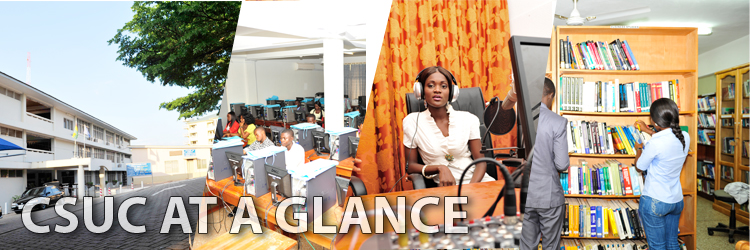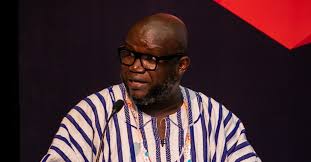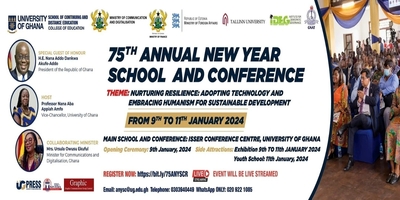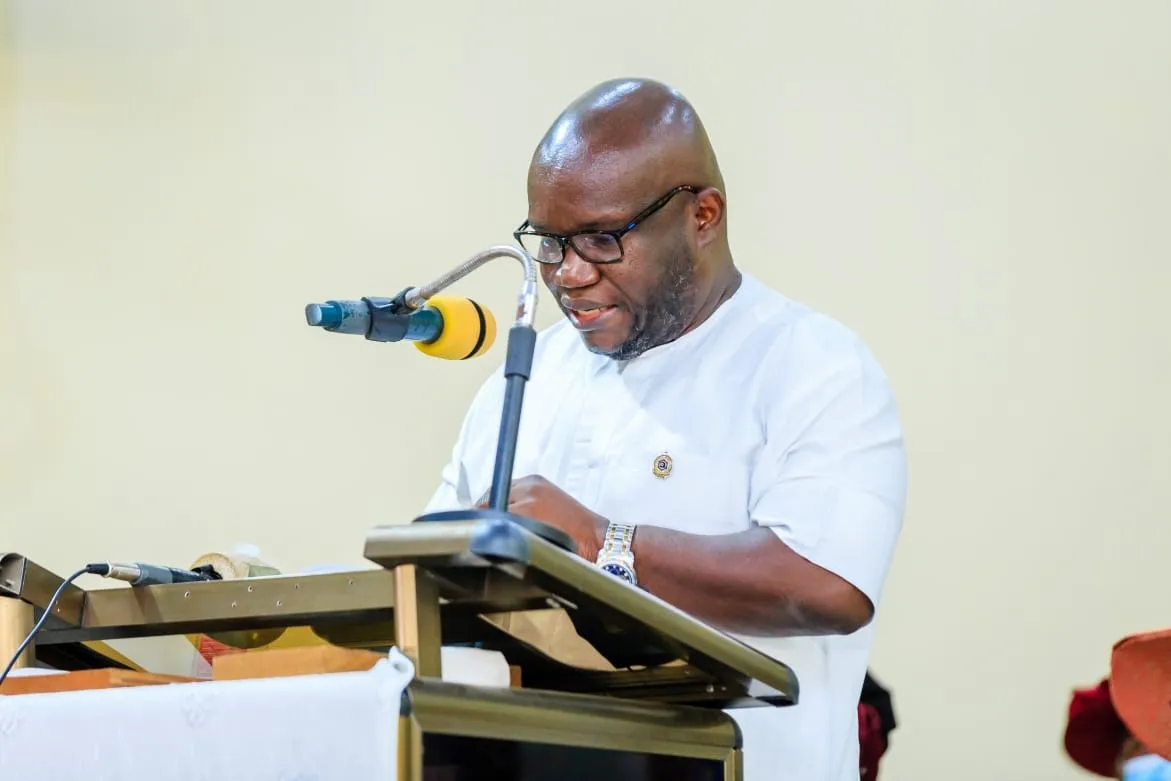It is a sin for Ghanaian Graduates to join the Unemployed Graduate Association
As I look at faces of the graduating students I see expectant but confused people about to leave the university for the world of work, for some of you, who are already working there is still uncertainty of what this education will do for you. They remind me of my own little story. After I left the university as a young engineering graduate, I was enthusiastic about the prospect of career success as an engineer but I was confused, too, about how I could achieve this success. I approached a man whose career success I had admired for a long time and asked him for his secret. He looked at me and calmly said, “My son, “the secret is confidence and integrity, but more importantly create the future you want for yourself with all you have learnt.” With that advice he went back to what he was doing. He had confused me the more. I decided then to find what link there is between career success and confidence coupled with integrity. Search I did and it did not take me to long, to find the link and I am still discovering that.
You should know this better than I, for your second value, as a University after the Lordship of Jesus Christ, which is indisputable, is integrity(Christian Service University College, 2015). But that is a conversation for another day. Today we are here to tell my brothers and sisters of the graduating class, one school-of-thought that I hold dear, it is that it is a grave sin for any of you here to join the unemployed graduates association.
Prof Chairman, Rt. Rev. Prof. Osei Safo-Kantanka the Council Chairman, Prof. Sam Afrane, President, members of the Faculty of CSUC, Grandaunts, students, ladies and gentlemen, why I say so is interesting and I am honoured for the opportunity to share it as I speak on “Graduate Unemployment and University Education in Ghana: the role of stakeholders.” I believe that after we run through them, we will know that he gave me his real secret to career success.
 What are the Key issues of graduate unemployment?
What are the Key issues of graduate unemployment?
- Loss of focus on the National Interest. Unbridled partisanship, Ghana has been replaced by NDC & NPP and we continue to govern with less than half of the human resources available to us as a country.
- Mismatch of qualifications with opportunities and challenges in the environment
- Mismatch of qualifications with employers’ needs:-
- How current and scalable is our ICT training in schools to what industry requires. Is it outmoded by the time we get out?
- The second area of mismatch lies in the divergence of jobs available versus the type of graduates or trainees being produced. For example, agricultural graduates find that they are overqualified for the more urgently needed low-level farm work. Similarly, clerical and sales jobs are more abundant than higher-level management jobs sought after by MBA graduates. Are we training Oil & Gas Technicians and Engineers or Oil & Gas MBA graduates. What skills are critical?
- Another common complaint is the lack of skills and experiences of young workers.
- Are universities, including CSUC producing “tailor-made” and rather than “trainable” graduates?
- Lack of supply and demand information on economy now and into the future
- Lack of supply and demand information on labour market
- One reason for the mismatch between demand and supply lies in the lack of appropriate and updated opportunity & labour market information.
- Secondly, there appears to be a discrepancy between labour market demand and supply, with employers saying they cannot find good people to fill vacancies, and yet the youth unemployment rate is increasing. Therefore, bridging the information gap between educational/training institutions and employers, and between people looking for opportunities, work and employers, is a practical strategy for us in Ghana.
- Lack of proper career guidance and information
- A major element pointed out by many employers is the unrealistic expectations and demands of young employees, especially given their lack of experience and skills. Providing career guidance programmes in secondary schools, universities, and vocational training institutions is helpful in narrowing the differences between the expectations of employers and employees.
- Lack of exposure of students to the real world of work
- Lack of soft skills: – Curricular contents in educational institutions stress core competencies of the three Rs – reading, writing and arithmetic – and core subjects. We are only training the head and not the heart, the hard skills and not the soft. Soft skills such as social skills, interpersonal relationships, motivation, critical thinking, communication, creativity, and so on are usually not taught within the formal setting of the school system. However, these attributes are extremely important to employers and to the world of work even if you work for yourself. While some can be learnt and assimilated through extracurricular activities, they are not systematically and sufficiently transferred to the students. Incorporation of programmes or subjects that emphasize such soft skills and the interest for lifelong learning will benefit the youth(UNESCO, 2007).
- Economic issues :-
- Our economic growth has contributed to some imbalances between supply and demand in human resources. The push for a knowledge-based society has seen an increase in the number of tertiary educational institutions and university graduates. The decreasing number of skilled vocational and technical workforce. Globalization has further opened the door to opportunities and challenges for trade and labour market. In Ghana as in other countries, first degrees are becoming irrelevant in the workplace, and many employment seekers have to relearn and retrain to fit into new job requirements. I pray that those of you who are already working and have come CSUC have found the very practical courses very useful and you have taken the education very seriously.
- Macroeconomic policies, international trade arrangements and multilateral agreements, all of which have an impact on job creation and loss, specific skill needs and so on, normally fall under the jurisdiction of Ministry of Finance and other economic departments with little or no input comes from the Ministry of Education or Labour and very little to do with academia.
- So do we have policy congruence, do we even own our policies or are they forced on us by the so-called development partners who have their own interest?
- Government
- Universities
- Parents
- Students
- Current Students
- Alumini
- Business and Industry
- Society
- And You – Graduating Students
What are the roles of Stakeholder?
Governments
It is critical for government, and I mean government in the broad definition to include
- The 3 arms of state,
- Those in majority and the minority ( I refuse to say those in power and opposition)
- Those of us who are here today and those who are to come
Should focus on the Ghanaian Interest and keep that paramount in all discussions and policy formulations.
Prof. Chairman; Government will have to build enabling environment for Ghanaians first before we also build it for others. God put us in Ghana for a purpose, as the Bible says in Matthew 22:39 And the second is like unto it, Thou shalt love thy neighbour as thyself.
So it starts with loving ourselves first and then loving the foreigners as much as we love ourselves. The Ghanaian self-hatred must stop. Lets build opportunities for our graduates to flourish here in Ghana. Opportunities for them to create businesses and also to own the heights of industries within, so they can be empowered to also go out and compete.
We need a complete methtanoyal, a change of heart, in Ghana. We also need to offer opportunities to our local companies to expand to absorb Graduates. Lets build and offer opportunity to grow a lot of genuine Ghanaian billionaires, who provide mentorship and be role models for our youth. As is said in Anlo “Xoxo anu wok gbe yeyie do’ to wit “it is on to the old that the new is built”
Governments should formulate ways to ensure that issues on education/training and skills are incorporated into macroeconomic policies, planning and research. For example, the skills of the workforce and the subject matter students are studying have an impact on attracting foreign direct investment.
Government should work on the collecting and making available basic statistics about everything starting with a centrally based identifications system, so we know who is where and what the demographics are. We also need to be able to provide unique geographic identification of all landed property in Ghana. Then we should have reliable data for planning. They should facilitate incorporation of the analyses of the trends in labour market needs as part of the economic projections and plans, and communicate this clearly to the education and training sectors.
Ministry of Educations should provide the proper policy directions for the building of partnerships and synergies between and among all the other stakeholders. It should direct government to channel polices and incentives into areas that support graduate self employments and employments.
The issue of local content should be taking very seriously and directed towards engaging the youth not as social interventions, which generally have proven not to be sustainable, but as business cultivation enterprises that will have profit motives, The latter generally tends to be sustainable.
Universities
The universities should work in aligning training to the current and future needs of national development. There the need on a consistent basis to ensure relevance of the course not to today’s needs but tomorrow. As the students you take in today will be getting into tomorrow’s market. So you have to be future oriented.
You need to be measuring quality based on your effect on national development and not just on profit basis. Profit is not your mandate, but more importantly how to make your products rich. If you achieve that, you will never be poor. Universities seek ye 1st the prosperity of your students and ye shall be super rich.
From, a survey of graduate unemployment in Malaysia, conducted by Universiti Sains Malaysia, it analyzed the differences in psychological attributes of employed and unemployed graduates. While all graduates surveyed believed that they were well qualified, the results suggested that unemployed graduates generally over-rated themselves, were unrealistic in their self-assessment and lacked initiative. This is a study I can confirm, in most job interviews I have conducted as an employer, most of those who are not successful are those that have very high expectation but offer very little value to the organization they want to join.
One recommendation from the study, which I want to share, pointed to the need for career counseling or placement department in every institution of higher learning. This should not only exist in name and but should be taken very seriously and have mandatory contact periods that should have SMART KPIs. These KPIs should not only be monitored and evaluated, but should be properly supervised.
In addition, the institutions should help students acquire communication skills, language proficiency and entrepreneurship skills. It should at the same time, work with industries to ensure the right match between supply and demand for human resources.
For entrepreneurship skills, this should be made compulsory from the entry into the school and should be a continuum till when the students complete their courses of study. The output should be for the students to identify opportunities and needs in the environment and apply the Universal knowledge that the tertiary education provides to solve them. We need to teach our students problem solving skills. It will be ideal if the students worked in teams for these projects.
The lecturers should in the process hone these plans into marketable business plans that can grow into businesses.
The institutions should hold Idea, Opportunity & Career Fairs, job fairs should be part of this. These are opportunities for the students to learn how to display and sell their ideas to investors, Banks and business to partners with them to grow these ideas into businesses.
We should teach our students that it is good to be rich from the fruit of your labor. You can only be rich when you work for yourself, it does not happen working for others. It is true that it is only entrepreneurs and intrepreneurs who will be rich, even if you are employed by others you will only find fulfillment if you work for yourself within the organization. Fulfillment is a higher form of richness. So we should stop the ‘it is government work’ mentality. It only blunts you as a person.
From Colossians 3:22-24 Bondservants, obey in everything those who are your earthly masters, not by way of eye-service, as people-pleasers, but with sincerity of heart, fearing the Lord. Whatever you do, work heartily, as for the Lord and not for men, knowing that from the Lord you will receive the inheritance as your reward. You are serving the Lord Christ.
Note we work only for 2 people God and ourselves
Business and Industry
It is about partnerships, we need to support the institutions provide the graduates we in industry want. It is not enough to complain about the quality of products we are getting out of the tertiary institutions and do nothing to reverse the trend. It will not work.
Two groups of job interviews I have enjoyed in recent times have been to recruit a doctor for the Graphic Clinic and a Head of Security. In all both sectors I found a common thread run through all of them. Their industries are directly involved in their training. There is apprenticeship, continue education and training, the Doctors and the Military are good at this. They produce their own timber.
Industry in general should emulate this and form strong partnerships with academia. It is only them that we will improve the quality of the output we get from our institutions and a lot more will leave the schools and build their own businesses and employ others other than getting into that sinful association. Prof. Chairman I will explain why it is sinful to join unemployed graduate association soon.
For industry as a major stakeholder we can learn from the New Zealand example, which has several interesting approaches to address the shortage of skilled workers, particularly through the school-to-work transition phase.
The business community should work closely with educational institutions to redress the problem of misalignment between the needs of industry and the curriculum of our schools. Apart from a structured dialogue between academia and industry, we could also have representation of Industry grouping, for example, sitting in as members of the boards of educational institutions and providing input into the curricula for students to learn skills needed by the industries.
We should have a lot of School-Industry Link programmes, which should go beyond just industrial attachments, which is also critical and should be made very functional with interactions between the schools and the management of industry. This would enable students to see how topics and theories they learn in school are put into practice at the workplace. It will provide them experience.
The School-Industry Link programmes should also include Lecturers placements in businesses or industries during the school holidays. This is an initiative that I have been offering to a lot of institutions but not one has taken it up. Prof President, I pray that today you will take my offer where we will have lecturers from Faculty of Humanities, especially Communications Studies, the School of Business, take up this offer. This will sensitize teachers to the skills their students should acquire to prepare them for their transition into the world of work. It will also help the lecturers apply their theories to helping industry to solve the challenges that confront them. It will also help the lecturers build local case studies rather than the foreign case studies that are lost on local context. Thus our products when they come out cannot apply the knowledge to solve local problems and to build their businesses or to work for others.
The Ministry of Education, GES and National Accreditation Board also have roles to play. We should start the path to graduate employment from as early as possible. From secondary schools it should be formalize. We could set up a day in the secondary calendar called the career day, where secondary school students select some organizations; this should include SME within their communities, to visit. This exposure will provide students at an early age opportunity to explore career options as well as impart a reality check on their expectations from the management and customers.
Apart from these school-business partnerships, the Ministry of Education should develop career advisory services – both online and phone-in – should be available to all jobseekers looking for information and guidance. It should have information of all courses offered by educational institutions in the country and what skills they will provide, which opportunities and what jobs they can lead to.
Parents: Do not put pressure on your ward, guide them but allow them to select subjects and careers that they are passionate about. Our careers cannot be a chore, we should enjoy it. Encourage us when we want to start small, but ensure that the dreams are big. Also show us all the options that are available.
Parents can also be involved in the career guidance process in school, and at work through “Bring Your Child to Work Day.” Once a year business should encourage parents to bring their children to work and introduce them to what happens at work.
Now to you the Graduating Class
You need to realize how blessed you are. For you it is more sinful, as you were trained in an institution that has its vision being “To be a first class Evangelical Christian University that promotes knowledge about Christ through the training of men and women with moral uprightness, academic excellence and passion to serve and transform society.” So you know that in Genesis 1:26 It is written that “And God said, Let us make man in our image, after Our likeness: and let them have dominion over the fish of the sea, and over the fowl of the air, and over the cattle, and over all the earth, and over every creeping thing that creepeth upon the earth”
- We just did not happen, we were made
- We were just not made but made by the Perfect Creator, who after creating everything including us said it was good. He is not man to lie, so if He says it was good, then we are good.
- The Perfect Creator did not just make us and we were good. But He made us in His image and likeness. So we all have God’s image that creates things in us
- Not only that but He says that we should have dominion.
So after all this what else do you need to know that you cannot allow yourself to be unemployed, as much as join an association of that. As a Catholic I will tell you, that it is a mortal sin.
We need to create the change that we want to see. We need to be prepared to think big but start small and grow. Nothing is beneath us. It is better to start some small low-level job than to join that association, sitting at home and doing nothing. We are blessed to be in a country from South to the North, West to the East where if you put a grain in the soil it will germinate. Agriculture is a great source of wealth and with our education from school we can make it into a great business starting with one acre but with plans for a business and we will make it.
Some of us have our parents who do some jobs, like farming, petty trading, local catering and see us through school. But when we complete our education, or even when we are in school and enjoying the benefits from that jobs, we do not want to be associated with them and apply our education to take it to the next level. My brothers and sisters most of these great businesses you see today, that you want to work for started as small business, but with big dreams. The examples are so many, how did UT Bank start, how about Multimedia and Kwame Despite ?
Graduate employment is not graduate working-for-someone. It should rather start from graduates creating their own jobs. Facebook started from the hallways of students and today it is a great business. They just saw an opportunity in man’s need for “konkonsa” and made a business out of it.
Dhirubhai Ambani, the founder of India’s largest private firm and second largest publicly traded company, Reliance Industries, Ambani has undoubtedly made enormous capital in his lifetime. But did you know that he started his journey with only Re 1 and while he has created wealth, it not just for him but equally for his thousands of shareholders. He says it aptly to you and I.
“If you don’t build your dream, someone else will hire you to help them build theirs.”
So I should listen and you should listen. I tell everybody who will listen that, the little assets I have, I got them working for myself, as an Electrical Contractor. Something I could do when I did other jobs, but as MD of Graphic that job has collapsed and I am poorer for it. I am sure I would have been richer concentrating on running my own firm.
But one thing all my bosses will tell you is that I take all the jobs I have done since school as my own, so I am fulfilled doing it. For me working Graphic is National Service, I do it like it is my own. But soon Graphic will end in the next 4 years and I already have a retirement plan.
I am going to work for myself as a farmer. God has told me that if apply all I have learnt including my Doctorate which I should complete in Corporate Governance to my farm, I will succeed in making the people of Abutia Kpota rich and I will not be poor. If within 30 years that village became a model town, my vision will have been attained. Watch that space, we are starting small but with great dreams, focused on solving the pains of others, not focused on money. Note that you will not make it iof your focus is on making a lot of money. Money should be the bye product of solving the pains and being useful to other people.
That is critical, focus on how useful you can be to society and God will reward you through people.
What I will ask you to do is that;
- Build relevant skills
A career objective alone can’t help you. You have to have the relevant set skills that your career requires. The reason is, it is your skills that your employer needs. Note here again the best employer you can have is your clients and customers. Without them, you are like a car without an engine. You are of no use.
You can gain more knowledge in your career to improve your confidence by learning your job formally and informally.
Robert Collier “Your chances of success in any undertaking can always be measured by your belief in yourself.”
- Build resilience
With skills you are on a good footing but you need resilience too. One thing you have to note is that life naturally has ups and downs. This affects all facets of human endeavor and your career is no exception. Resilience is what I call this ability to rise from the lows. It takes a confident person to believe that she can, and actually, rise when he falls.
One of the favorite Biblical quotation of my brother Komla Dumor is apt here, it links resilient to the next sub theme – 1 Samuel 30:6 And David was greatly distressed; for the people spake of stoning him, because the soul of all the people was grieved, every man for his sons and for his daughters: but David encouraged himself in the LORD his God.
- Motivate yourself
It is important to note though that you cannot be resilient if you don’t have the ability to motivate yourself, because it is self-motivation that encourages you to go on when it seems that failure is staring you in the face, when things are tough such that you begin to feel that your current capability is not enough for your task. – “but David encouraged himself in the LORD his God.” (Ashigbey, 2015)
- Admit mistakes for correction
- Set success benchmarks
- Integrity – this is critical
If you don’t have integrity, you may find it difficult to have a career rise.
Conclusion
As I bring my speech to an end, I would like you to remember that we all have a role to play to ensure that our graduates are employed and can also employ others.
My epilog has 3 things
- Don’t leave here hoping to be employed, start thinking of how you can employ people. What are you going to create. Think big and global but start small with an insatiable aptitude and appetite for greatness. Note that the enemy of greatness is good. Get out of the bad Ghanaian habit of “artificial modesty” – When asked How are things? Our response is small-small. Why not big-big! We set very low targets for ourselves and miss them any way, so we wallow in mediocrity. You can become the world best so-&-so. We were all made in the image and likeness of God. If anybody can do it, you can also do it. Dream big but again have a plan and start small.
- Let me speak to the Ghanaians among you, build networks, partnerships and let us all give ourselves the opportunity to fail forward. Patronize Ghanaian products, support Ghanaian businesses. Lets stop the self-hatred of the Ghanaian. Yes lets welcome our brothers and sisters from other countries; they will come to complement what we do. But it is only when we have Ghanaians at the helm of ALL industries that Ghana will develop. So support Ghana & let Ghana be at the center of all you do. For those of you who will go into politics, and for all of us let all your actions be geared towards impact and legacy for the Ghanaian unborn, tribute to those dead and gone and a better life for us living today. Let it not be only for winning the next elections.
- Lets eschew mediocrity – My Bible says in Psalms 107:23 They that go down to the sea in ships, that do business in great waters; 107:24 These see the works of the LORD, and his wonders in the deep.
Thank you and God bless us all.
http://graphic.com.gh/news/education/55122-don-t-join-unemployed-graduates-association.html
This post has already been read 1290 times!












2 comments